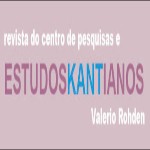O PAPEL DA AFINIDADE TRANSCENDENTAL ENTRE OS FENÔMENOS NA TEORIA DO CONHECIMENTO KANTIANA
v. 5 n. 1 (2017) • Estudos Kantianos [EK]
Autor: Gualtiero LORINI
Resumo:
The article focuses on a concept placed at the core of the A-Deduction, of which the B-Version provides a different but not necessarily better exposition. It is the concept of “transcendental affinity” [transcendentale Affinität] (A 144). This concept is not present in the whole B-Edition of the KrV, and even the term “Affinity” does not appear in the B-Deduction, but only four times in the Transcendental Dialectic, and twice in the Discipline of the Pure Reason. In the economy of the A-Deduction, the concept of “transcendental affinity” plays a central role. It represents indeed the “thoroughgoing connection according to necessary laws” of all the possible phenomena. This connection is presupposed by transcendental consciousness insofar as it has a representation of these phenomena and their relationships, since what all the possible phenomena share is their determination in space and time according to the synthetic unity of the apperception. The concept of transcendental affinity between all the possible phenomena is intimately linked to imagination, which makes this affinity arise by reproducing a phenomenon in space and time according to the a priori laws of understanding. The necessary link between transcendental affinity and imagination represents an important passage in this paper. One goal is to point out that the implications of transcendental affinity are not rejected but rather deepened in the B-Deduction. On these assumptions, we consider the role of the “I think” in the B-Deduction, in order to claim that it implicitly relies upon the concept of transcendental affinity too. The last part of the paper aims to point out that the transcendental affinity between the phenomena described
in the A-Deduction is particularly apt to understand the unity of the representation of nature. To shed light on this point, we will deal with some significant passages from the Opus postumum.
Texto Completo: http://www2.marilia.unesp.br/revistas/index.php/ek/article/view/7087

Estudos Kantianos [EK]
Revista do Centro de Pesquisa e Estudos Kantianos Valério Rohden
